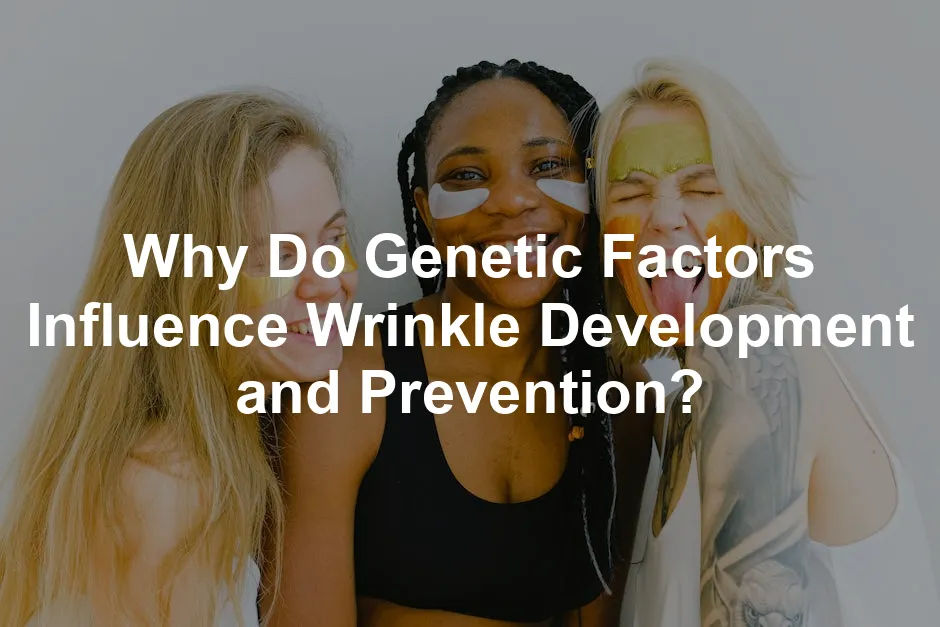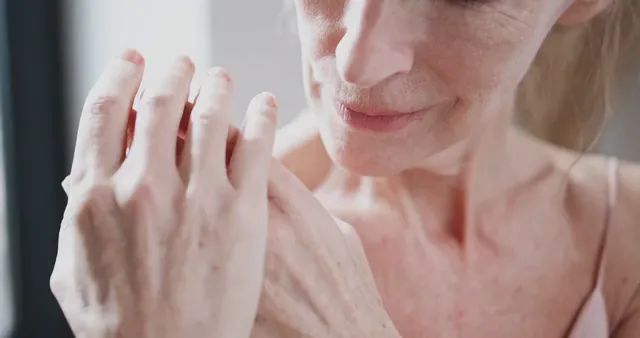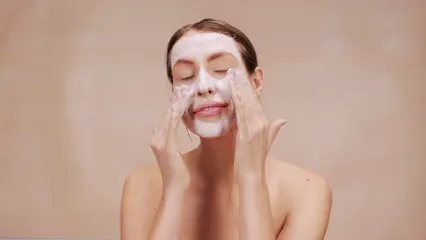
Why Do Genetic Factors Influence Wrinkle Development and Prevention?
Introduction
In a world where serums and creams promise to erase the years from our skin, the truth is that some elements of aging are etched in our DNA. Wrinkles, those telltale indicators of aging, can be as much a product of our genetic makeup as they are of sun exposure or lifestyle habits.
Research suggests that nearly 60% of skin aging, including wrinkles, is influenced by genetic factors. Imagine the power of your family tree revealing not just who you resemble, but also how your skin might age! The intricate relationship between our genes and wrinkle formation is a fascinating area of study, showing that your genetic heritage is like a map for your skin’s future.
Collagen and elastin are the dynamic duo in the skincare world. These proteins keep our skin plump and elastic, but genetic variations can affect their production. If your genes dictate a lower collagen production, you may notice wrinkles forming sooner than your friends. This genetic influence explains why some individuals seem to age gracefully, while others develop pronounced wrinkles at an early age.
To keep your skin hydrated and youthful, consider adding a Neutrogena Hydro Boost Water Gel Moisturizer to your skincare routine. This lightweight gel provides intense hydration, making your skin feel plump and refreshed, just like a cool drink of water on a hot day!
Hormonal changes also play a role. For instance, estrogen levels, which decline during menopause, significantly impact collagen production. If your family has a history of early wrinkles, guess what? You might be on the same path, thanks to those inherited genes.
Ethnic differences further complicate the story. Studies show that Caucasians generally experience earlier and more pronounced signs of skin aging compared to other ethnic groups. This variation highlights the importance of understanding genetic backgrounds in wrinkle prevention strategies.
So, what can you do? While you might not be able to change your genetic makeup, knowledge is power. Understanding your genetic predispositions allows you to tailor your skincare regimen accordingly. For example, if your family history suggests early aging, you might prioritize sun protection and hydration in your daily routine.
For an added boost of hydration, try the Olay Regenerist Micro-Sculpting Cream. This luxurious cream is packed with powerful ingredients that work to hydrate and firm your skin, combating those pesky wrinkles effectively!
In this article, we’ll uncover the surprising ways in which your genes dictate not just when you wrinkle, but how you can effectively prevent it. By recognizing the genetic influences on your skin, you can take proactive steps to maintain your youthful glow for years to come.
Understanding how genetic factors influence wrinkle development can be crucial in skincare. why do genetic factors influence wrinkle development and prevention

The Science of Wrinkles
What Are Wrinkles?
Wrinkles are those pesky lines, folds, or creases that creep into our skin as we age. They can be classified into two main types: dynamic and static. Dynamic wrinkles form from repeated facial movements, like smiling or frowning. These are often visible when you make expressions. On the other hand, static wrinkles are present even when your face is at rest. Think of them as the permanent residents of your skin, often seen around the mouth and eyes.
Now, how do these lines form? The biological process behind wrinkle formation is a bit complex. As we age, our skin loses collagen and elastin—two essential proteins that keep our skin smooth and elastic. Sun exposure, pollution, and lifestyle choices accelerate this process. Over time, the skin becomes thinner, drier, and less resilient, leading to those stubborn wrinkles we all know too well.
The Role of Collagen and Elastin
Collagen and elastin are like the superheroes of skin health. Collagen provides structure and strength, while elastin allows the skin to stretch and return to its original shape. Unfortunately, as we age, our bodies produce less collagen and elastin. This decline contributes to sagging skin and wrinkle formation.
Genetic variations can significantly affect how much collagen and elastin our bodies produce. Some people inherit genes that promote abundant collagen and elastin, giving them that enviable youthful glow. Others may inherit genes that lead to less production, resulting in earlier wrinkle formation. If your skin tends to sag like a deflated balloon, blame it on your inherited genes!
To aid in collagen production, consider incorporating The Ordinary Hyaluronic Acid 2% + B5 into your routine. This powerful serum can help to attract moisture to the skin, enhancing hydration and plumpness, giving you that youthful bounce!
Environmental Factors vs. Genetic Factors
When it comes to aging, it’s essential to understand the difference between intrinsic and extrinsic factors. Intrinsic aging is all about genetics—those inherited traits that determine how your skin ages. Extrinsic aging, however, involves environmental factors like sun exposure, pollution, and smoking.
UV rays are notorious for being skin’s worst enemy. They damage collagen and elastin, leading to premature aging. Pollution can also take a toll, causing oxidative stress that accelerates the aging process. Lifestyle choices, such as smoking and poor diet, further contribute to wrinkles. While you can’t change your genetic makeup, you can certainly control your environment and habits to help slow down the aging clock.
Understanding the balance between these two factors is crucial for effective wrinkle prevention. By protecting your skin from harmful environmental influences and being mindful of your genetic predisposition, you can take proactive steps to minimize the appearance of those annoying wrinkles.
Gender and Ethnic Differences
Wrinkle formation reveals intriguing differences among genders and ethnic groups. Studies show that men and women age differently, thanks to hormonal influences and skin structure variations. For instance, men typically have thicker skin than women. This thickness affords them a bit more resilience against the visible signs of aging. On the flip side, women experience more pronounced wrinkle formation earlier in life. Hormonal fluctuations, especially during menopause, play a big role in this difference. As estrogen levels drop, collagen production takes a hit. The result? A fine line parade on women’s faces while men may hold off on the wrinkles a little longer.
Ethnic differences further complicate this wrinkle riddle. Caucasian skin usually shows signs of aging sooner than Asian skin types. Research indicates that Caucasians often develop wrinkles earlier and with greater severity. In contrast, people with darker skin tones tend to have more melanin, which provides natural protection against harmful UV rays. This protection can delay the onset of wrinkles. Asian skin may also show distinct properties, such as increased thickness and better moisture retention, contributing to a more youthful appearance for longer. Understanding these differences is vital for tailoring effective skincare routines and wrinkle prevention strategies based on individual genetic backgrounds.
The Role of Hormones
Hormonal changes are sneaky culprits in skin aging. They can dramatically shift how our skin looks and feels over time. Take estrogen, for instance. This hormone is essential for maintaining collagen production. When estrogen levels decline, especially during menopause, the skin reacts like a drama queen—it loses elasticity and firmness. This loss can result in wrinkling and sagging, making it crucial for women to pay attention to their hormonal health as they age.
But that’s not all! Androgens also come into play. These hormones, typically higher in men, influence skin thickness and oil production. The thicker skin of males can be a blessing, helping them combat wrinkles more effectively than their female counterparts. Yet, as men age, their testosterone levels decrease, which can also affect skin quality and contribute to the wrinkle-making process.
Understanding the relationship between hormones and skin aging can empower individuals to make informed choices about skincare and treatments. After all, knowing what’s happening beneath the surface helps us tackle those pesky wrinkles head-on!

Prevention and Treatment Strategies
Understanding Your Genetic Risk
Let’s face it: our genes are like the blueprints for our skin. Family history plays an enormous role in predicting how our skin will age. If your parents sported wrinkles at a young age, chances are you might too. It’s like an unwelcome inheritance. But fear not! Genetic testing is becoming more accessible and offers a peek into your skin’s future. By identifying specific genetic markers linked to aging, you can tailor your skincare routine to combat those pesky wrinkles effectively.
Genetic testing can reveal your skin’s unique vulnerabilities. For example, some people may have variants in genes that affect collagen production, making them more prone to wrinkles. This knowledge allows for a more personalized approach to skincare. Instead of following generic advice, you can focus on strategies that cater specifically to your genetic makeup. Whether it’s upping your sun protection game or choosing the right moisturizers, understanding your genetic risk can empower you to take control of your skin’s fate.
Discovering your family history can also guide your choices. Talk to family members about their skin aging experiences. Learning what worked for them (and what didn’t) may offer valuable insight. After all, the wisdom of generations past can be a powerful ally in your quest for youthful skin.
Preventative Measures
Incorporating daily routines that respect your genetic predispositions can mitigate the impact of aging. Start with sun protection; it’s your skin’s best friend. Wearing sunscreen with a minimum SPF of 30 daily can dramatically reduce UV damage. This is especially critical for those who may have inherited a lighter skin tone, as they are often more susceptible to sun damage.
Speaking of sun protection, don’t forget to consider La Roche-Posay Anthelios Melt-in Milk Sunscreen SPF 60. This sunscreen not only protects against harmful UV rays but also nourishes the skin, making it a must-have for your daily routine!
Hydration is equally essential. Keeping skin moisturized can help maintain elasticity and reduce the appearance of fine lines. Use products that contain ingredients like hyaluronic acid, which can hold water and keep your skin plump. A well-hydrated complexion is less likely to show signs of aging.
Nutritional factors also play a role. Consuming a balanced diet rich in antioxidants, vitamins, and minerals can support skin health from the inside out. Foods high in vitamin C, for example, can boost collagen production. Don’t forget hydration—drinking enough water daily is crucial for maintaining skin moisture.
For a little extra help in your skincare routine, consider the Vichy Mineral 89 Hyaluronic Acid Face Serum. This serum offers a boost of hydration, helping to fortify the skin barrier and enhance moisture retention, making your skin look more radiant!
Advanced treatments can also be tailored to your genetic risks. Options like Botox, dermal fillers, and laser therapy can provide significant improvements. These treatments help restore volume and stimulate collagen production, combatting the signs of aging effectively.
Ultimately, understanding your genetic predispositions allows you to adopt a proactive approach to your skincare routine. By combining preventative measures with personalized treatments, you can help ensure your skin remains youthful for years to come.

Advanced Treatments
Advanced treatments offer exciting possibilities for wrinkle management, especially for those with genetic predispositions. First, let’s look at dermatological treatments like Botox and dermal fillers. Botox is a go-to for dynamic wrinkles, those pesky lines that appear with facial movements. It works by temporarily paralyzing the muscles that cause these lines. For static wrinkles, dermal fillers are the magic wands. They restore lost volume and smooth out wrinkles, giving immediate results.
But wait, there’s more! Emerging technologies are changing the game in skin care. Gene editing and nutrigenomics are two exciting fields. Gene editing, like CRISPR, holds potential to alter genes related to collagen production. Imagine a world where we could tweak our DNA to fight aging! On the other hand, nutrigenomics explores how our genes interact with the foods we eat. Personalized diets based on genetic makeup could enhance skin health and wrinkle prevention.
With these advanced treatments and technologies, you can take a proactive approach to combat wrinkles. So, whether you’re reaching for sunscreen or considering a trip to the dermatologist, remember: your skin deserves all the love and attention!

FAQs
Are wrinkles purely genetic?
Wrinkles are not purely genetic; they result from a mix of genetics and environmental factors. Genetics play a significant role, with studies suggesting that nearly 60% of skin aging can be attributed to hereditary traits. This means if your parents had wrinkles early, you might follow suit. However, environmental influences like sun exposure, pollution, and smoking also contribute significantly to wrinkle formation. Picture this: even if you hit the genetic jackpot, neglecting sun protection can still lead to premature aging. So, while genetics lays the groundwork, your lifestyle choices can tip the scales either way.
Can I prevent wrinkles if my family has a history of early aging?
Absolutely! Even if your family tree boasts early wrinkles, there are plenty of preventative measures you can adopt. Start with sun protection—always wear broad-spectrum sunscreen with at least SPF 30. This simple step can save your skin from the sun’s damaging rays. Hydration is also key; keep your skin moist with quality moisturizers. A diet rich in antioxidants (think fruits and veggies) can support skin health. Plus, regular exercise and avoiding smoking can work wonders. Remember, while genetics may set the stage, you control the performance!
What role does skin type play in wrinkle formation?
Skin type plays a vital role in wrinkle formation and can show varying genetic vulnerabilities. For instance, oily skin types may experience fewer wrinkles due to the natural moisture from sebum. In contrast, dry skin often shows signs of aging earlier because it lacks hydration. Additionally, individuals with fair skin may be more prone to UV damage and, consequently, wrinkles. Ethnic differences also come into play; darker skin tones tend to have higher melanin levels, providing some natural protection against sun damage. Ultimately, understanding your skin type can help tailor your skincare routine for wrinkle prevention.
Is genetic testing for skin aging worth it?
Genetic testing for skin aging can be quite beneficial, though it has its limitations. By examining your specific genetic markers, you can gain insights into your skin’s aging patterns. This knowledge can help you select the right products and treatments tailored to your genetic predispositions. However, it’s important to remember that genetics is just one piece of the puzzle; environmental factors still play a crucial role. While genetic testing can guide your skincare decisions, it shouldn’t be the sole determinant of your routine. Consider it as a helpful tool in your broader anti-aging strategy.
How can I find out more about my genetic predisposition to wrinkles?
To uncover your genetic predisposition to wrinkles, consider consulting a dermatologist specializing in genetics. They can recommend genetic testing services that analyze specific SNPs associated with skin aging. Many companies offer at-home testing kits that provide insights into your genetic makeup. Once you have your results, discuss them with your dermatologist. They can help interpret the findings and suggest personalized skincare routines or treatments tailored to your unique genetic profile. Knowledge is power, and understanding your genetic risks can empower you to take proactive steps in your skincare journey.
Please let us know what you think about our content by leaving a comment down below!
Thank you for reading till here 🙂
For an all-around skincare experience, don’t miss out on Drunk Elephant C-Firma Day Serum. This serum is packed with antioxidants that brighten your skin while reducing the appearance of fine lines, making it a fantastic addition to your morning routine!
And for a luxurious night cream, try the RoC Retinol Correxion Deep Wrinkle Night Cream. This cream works overnight to visibly reduce wrinkles and fine lines, ensuring you wake up with skin that feels rejuvenated!
All images from Pexels




